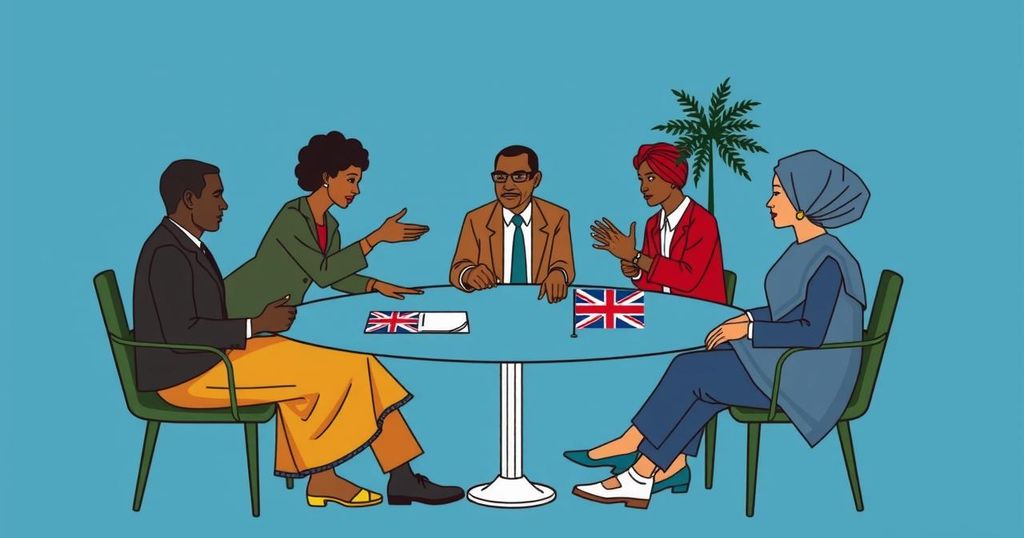Commonwealth Nations Convene in Samoa to Address Slavery Reparations and Climate Change

Commonwealth leaders are convening in Samoa to address significant issues such as climate change and slavery reparations during the Heads of Government Meeting. As many member nations face acute risks from climate change, discussions will highlight ocean protection and the call for reparations from the UK for its historical role in slavery. Despite the UK government not prioritizing the reparations topic, leaders advocate for dialogue on this crucial matter.
In a significant gathering in Samoa, Commonwealth leaders are addressing pressing global issues, notably climate change and reparations for the historical injustices associated with the transatlantic slave trade. As part of the Commonwealth Heads of Government Meeting (CHOGM), which commenced on Monday, representatives from 56 nations, including King Charles of Britain, are convening to discuss the impact of climate change, particularly on small island states that remain vulnerable to rising sea levels. A poignant warning was given by United Nations Secretary-General Antonio Guterres, who noted that ocean temperatures in the Pacific Islands are increasing at three times the global average, posing an acute threat to these regions. Australian Foreign Minister Penny Wong emphasized that climate change represents not just an environmental challenge, but also a stark existential threat and a significant national security peril for Pacific nations. Additionally, African countries like Zambia echoed concerns regarding the substantial effects of climate change on food security. During the summit, King Charles will witness firsthand the consequences of climate change, as Samoan leaders illustrate the displacement of communities due to encroaching sea levels. Leaders are also expected to release a declaration focused on ocean protection, highlighting the centrality of climate change in their agenda. Another critical issue being addressed is the demand for reparations from the United Kingdom for its role in the transatlantic slave trade. Although British Prime Minister Kier Starmer announced that the government would not prioritize discussions on reparations at the summit, he expressed readiness for dialogue with leaders seeking to raise the issue. The Caribbean Community (CARICOM) has established a commission to advocate for reparations from former colonial powers, setting the stage for what some view as a necessary confrontation with historical injustices. Proponents argue that reparations are essential for rectifying the enduring racial disparities originating from slavery, while opponents believe it is inappropriate to hold current nations accountable for historical actions. A representative from CARICOM emphasized that CHOGM provides a vital opportunity for discussions on reparations, characterizing it as a priority for many Commonwealth countries. Kingsley Abbott from the University of London’s Institute of Commonwealth Studies remarked, “It is a priority for many of the Commonwealth’s member countries and whenever those affected by atrocities ask to talk, there should always be a willingness to sit down and listen.” This summit signifies a pivotal moment for Commonwealth nations as they grapple with the legacies of their histories and the urgent realities of climate change.
The Commonwealth Heads of Government Meeting (CHOGM) is a biennial assembly of leaders from the Commonwealth of Nations, which comprises countries formerly part of the British Empire. The discussions at this year’s summit are notably centered around reparations for the historical injustices linked to the transatlantic slave trade and the urgent challenges posed by climate change, particularly for island states susceptible to sea-level rise. The Commonwealth is composed of diverse nations, many of which are small states that face existential threats from climate change, underscoring the need for significant international dialogue and cooperation.
The ongoing CHOGM in Samoa represents a critical juncture for Commonwealth nations as they confront pressing issues of climate change and historical reparations. As leaders engage in dialogue, the discussions around reparations for slavery highlight the need to acknowledge and address historical injustices, while the focus on climate change underscores the precarious situation faced by vulnerable nations. The commitment to ocean protection and the advocacy for reparations highlight the urgency for collaborative global action to foster resilience and equity in light of historical and contemporary challenges.
Original Source: www.swissinfo.ch






